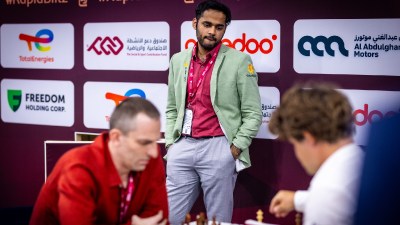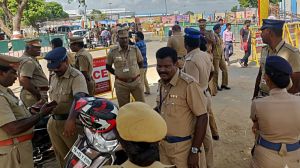An old, new flame
Misgivings have arisen in India that our relations with Russia have cooled off recently.

Misgivings have arisen in India that our relations with Russia have cooled off recently. Some protocol problems associated with recent high-level visits have fed this feeling.
Reports about difficulties in our defence relationship, with delay in project completion, cost over-runs and defective equipment, have reinforced this impression.
Russia has enjoyed, traditionally, quasi-immunity from criticism in India at the official level and in the media. It has been generally viewed as a steady, reliable friend of India, standing by our side politically, economically and militarily when needed. Our policy-makers believe that our national interests are well served by close friendship and understanding with Moscow.
To understand the present state of India-Russia relations, we may need to go back a little. After the Soviet break-up, our relations experienced some hiccups. Russia, vulnerable and anxious to secure western political and financial support, saw its future as a country organically linked to Europe through democracy and the market economy. A new mantra of pragmatism was to define henceforth all relationships, including with India. Russia8217;s European bid failed in the face of western determination to consolidate its strategic advantage over a weakened Russia by extending NATO and the EU into Russia8217;s near-abroad. Developments in Ukraine and Georgia, coloured revolutions, the politics of oil to break Russia8217;s hold, not to mention the castigation of President Putin for reversing political and economic reforms, explain his February 2007 Munich speech, Russia8217;s increasing self-assertion, the overtures to China and re-evaluation of ties with India and the concomitant trilateral Russia-India-China dialogue.
The India-Russia relationship, although back on track, has not gathered enough steam. One reason could be Russia8217;s judgment that India is not as useful to it immediately as China is for countering western pressure, for promoting multi-polarity and jointly resisting in the Security Council western solutions to international problems. Another reason is the stagnation of economic ties between India and Russia. At 4 billion, the two-way trade is insignificant and even the target of 10 billion by 2010 is relatively modest. Yet, India and Russia are the fastest growing emerging markets. The international trade of the two countries has grown impressively in volume and so have their foreign exchange reserves. If Russia is consolidating its position in the oil/gas, minerals and metals sector internationally, India has become an international player in the IT and ITES sector and generally in the knowledge economy. The entrepreneurs of the two countries have not yet found a way to marry their interests and capacities to mutual advantage.
So, not unsurprisingly, defence remains the pillar of our strategic partnership, as decisions in this sector remain in government hands, and are not always based on competition or the logic of the market economy. Today, India is Russia8217;s largest market for defence exports. India is currently procuring: the aircraft carrier Gorshkov along with 12 Mig 29K aircraft; 230 SUMKI aircraft; 1347 T-90 tanks; 3 additional frigates; 3 Smerch rocket launchers; 80 Mi 17 medium lift helicopters. Upgrades of earlier acquired aircraft and helicopters are currently under consideration. The Brahmos missile has received large orders from our navy and army and an air version is being developed. Till mid-2007, over 14 billion worth of Indo-Russian defence contracts were in varying stages of implementation. New contracts signed subsequently would increase the figure by a few billion dollars more.
Such an intensive relationship cannot be immune from problems. The Russians now want to sell arms not at 8216;friendship8217; but commercial prices, without providing 8216;commercial8217; quality of after sales service. Lack of adequate product support, which includes maintenance of support facilities, supply of spare parts, training and technical documentation, has become a serious issue. The unhealthy practice of signing the main contract and supplementary contracts for spare parts, training and documentation etc invites negotiating difficulties. Delays in supplies, cost escalation, unpredictable pricing decisions etc are other irritants. The Gorshkov project has become the most visible example of underlying problems.
The Russian side blames us, in turn, for dilatory tendering procedures, slowness in decision-making, piecemeal ordering of spare parts instead of consolidated indents which would allow proper planning and production by Russian manufacturers, and of violating IPRs by procuring spare parts from other countries. However, what for Russia is a commercial problem becomes a security problem for us, as the operational availability of the equipment is of foremost importance. There is a mismatch in the consequences for the two sides of any sub-optimal performance in fulfillment of contracts.
Despite problems, India has demonstrated its political commitment to strong India-Russia defence ties by the decision to jointly develop the Multi-Role Transport Aircraft and the Fifth Generation Fighter Aircraft, which will tie up our respective defence establishments even more. This is a clear signal that Russia will continue to enjoy a privileged position in India8217;s defence sector.
One should be cautious about calls for diversification acquiring unnecessary political overtones. Some diversification is already occurring and more will happen as other competitors join the fray. Russia is a trusted partner and trust in defence matters has to pass the test of time and of difficult circumstances. We must also put in the equation the incalculable political, military and economic benefits we derive from Russian acceptance of our pre-eminence in South Asia, their respect for our interests in the region, their non-interference in our relations with neighbours and, importantly, their policy of not selling arms to Pakistan.
India and Russia need, however, to ensure that their relationship does not rest on one strong pillar of defence. If defence ties continue to define the strategic nature of our partnership, we run the risk of ups and downs inherent in decisions on defence tenders colouring perceptions about the state of our ties. The loss of a major tender for purely competitive reasons can generate political misgivings. The relationship therefore needs the ballast of sizeable economic exchanges. Amongst others, energy security provides a critical strategic area of cooperation based on Russia8217;s oil and gas surpluses and India8217;s acute hydrocarbon deficit.
Today, a rising India and a resurgent Russia can build a strong relationship on much more balanced terms than before. For this both sides have to show greater imagination. The foundations of India-Russia relations are strong, and they can support a much larger edifice than that we have presently built.
The writer is a former foreign secretary and a former ambassador to Russia kanwalsibalgmail.com
- 01
- 02
- 03
- 04
- 05































